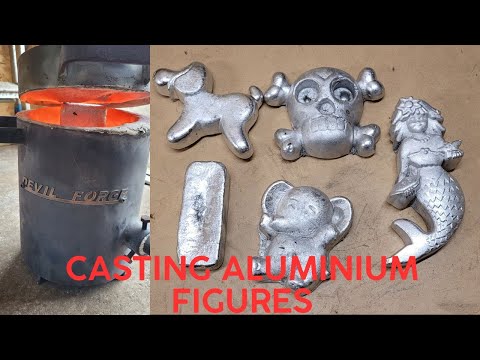The Best Strategy To Use For Stahl Specialty Company
The Best Strategy To Use For Stahl Specialty Company
Blog Article
All about Stahl Specialty Company
Table of ContentsThe smart Trick of Stahl Specialty Company That Nobody is Talking AboutThe 6-Second Trick For Stahl Specialty CompanyStahl Specialty Company Things To Know Before You Get This9 Simple Techniques For Stahl Specialty CompanyWhat Does Stahl Specialty Company Mean?
The subtle difference depends on the chemical material. Chemical Comparison of Cast Aluminum Alloys Silicon advertises castability by lowering the alloy's melting temperature level and boosting fluidity throughout spreading. It plays an important duty in permitting elaborate mold and mildews to be loaded accurately. Furthermore, silicon contributes to the alloy's stamina and put on resistance, making it important in applications where toughness is essential, such as automobile parts and engine components.It likewise boosts the machinability of the alloy, making it easier to refine into ended up products. In this way, iron adds to the general workability of aluminum alloys. Copper enhances electrical conductivity, making it beneficial in electric applications. It also boosts deterioration resistance and includes to the alloy's general toughness.
Manganese adds to the strength of light weight aluminum alloys and improves workability. It is frequently utilized in wrought light weight aluminum products like sheets, extrusions, and profiles. The presence of manganese aids in the alloy's formability and resistance to splitting during construction procedures. Magnesium is a light-weight component that provides strength and impact resistance to aluminum alloys.
It enables the production of light-weight components with excellent mechanical residential properties. Zinc boosts the castability of aluminum alloys and assists control the solidification procedure throughout spreading. It boosts the alloy's stamina and firmness. It is commonly discovered in applications where elaborate shapes and great details are necessary, such as ornamental spreadings and certain vehicle components.
The Best Strategy To Use For Stahl Specialty Company
Because aluminum-silicon alloys have excellent casting residential properties, high gas buildings, basic processes, and superb corrosion resistance, aluminum-silicon alloys are most commonly used in the die-casting industry in the house and abroad. At the exact same time, aluminum-silicon alloys are additionally fairly very early and extensively recognized alloys created and utilized in die-casting. After continual study and enhancement, the majority of the present international mainstream aluminum-silicon alloys have been wrapped up and are nothing greater than A356, A360, A380, ADC12, B390, and A413.
The key thermal conductivity, tensile stamina, yield stamina, and prolongation differ. Select ideal resources according to the efficiency of the target product produced. Among the above alloys, A356 has the greatest thermal conductivity, and A380 and ADC12 have the least expensive. The tensile limit is the opposite. A360 has the finest return stamina and the highest prolongation price.

How Stahl Specialty Company can Save You Time, Stress, and Money.
In accuracy casting, 6063 is fit for applications where elaborate geometries and high-grade surface area coatings are vital. Examples include telecommunication great site enclosures, where the alloy's superior formability permits for smooth and aesthetically pleasing styles while preserving architectural integrity. Likewise, in the Lights Solutions market, precision-cast 6063 parts develop classy and reliable illumination components that call for intricate forms and great thermal efficiency.
(https://filesharingtalk.com/members/606697-stahlspecialc)
It brings about a better surface area finish and much better deterioration resistance in A360. The A360 exhibits remarkable elongation, making it suitable for complex and thin-walled parts. In precision spreading applications, A360 is appropriate for markets such as Customer Electronic Devices, Telecommunication, and Power Devices. aluminum metal casting. Its improved fluidness enables elaborate, high-precision components like smartphone housings and interaction gadget housings.

In accuracy spreading, aluminum 413 shines in the Consumer Electronic Devices and Power Devices industries. It's typically made use of to craft elaborate parts like smart device housings, cam bodies, and power tool casings. Its precision is impressive, with limited tolerances as much as 0.01 mm, making certain flawless product assembly. This alloy's exceptional rust resistance makes it an excellent selection for outside applications, guaranteeing durable, long lasting products in the pointed out industries.
The smart Trick of Stahl Specialty Company That Nobody is Talking About
The aluminum alloy you choose will considerably influence both the casting procedure and the buildings of the final item. Because of this, you must make your choice meticulously and take an enlightened method.
Determining the most suitable light weight aluminum alloy for your application will mean considering a vast selection of qualities. The very first category addresses alloy features that impact the production process.
The alloy you select for die spreading straight affects several aspects of the spreading process, like just how easy the alloy is to collaborate with and if it is prone to casting flaws. Hot breaking, likewise referred to as solidification cracking, is a normal die casting problem for aluminum alloys that can result in interior or surface-level splits or fractures.
The Only Guide for Stahl Specialty Company
Particular aluminum alloys are much more prone to hot cracking than others, and your choice ought to consider this. An additional typical problem discovered in the die casting of aluminum is pass away soldering, which is when the cast sticks to the die wall surfaces and makes ejection difficult. It can damage both the cast and the die, so you need to look for alloys with high anti-soldering residential properties.
Corrosion resistance, which is already a notable characteristic of light weight aluminum, can differ substantially from alloy to alloy and is an important characteristic to consider relying on the ecological problems your item will be exposed to. Wear resistance is another residential or commercial property commonly sought in aluminum items and can differentiate some alloys.
Report this page